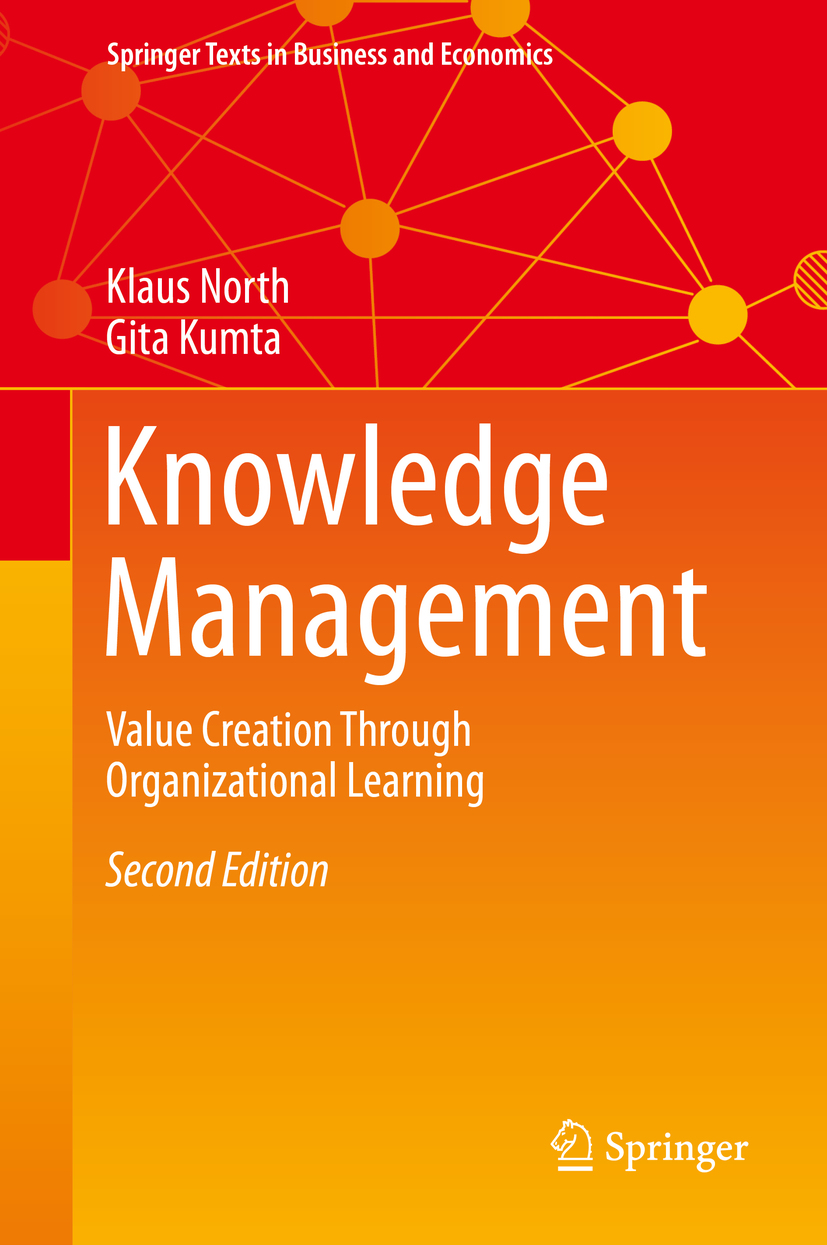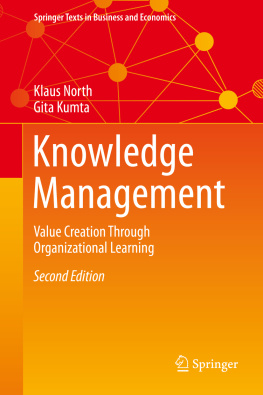Klaus North - Knowledge Management
Here you can read online Klaus North - Knowledge Management full text of the book (entire story) in english for free. Download pdf and epub, get meaning, cover and reviews about this ebook. year: 0, publisher: Springer International Publishing, genre: Business. Description of the work, (preface) as well as reviews are available. Best literature library LitArk.com created for fans of good reading and offers a wide selection of genres:
Romance novel
Science fiction
Adventure
Detective
Science
History
Home and family
Prose
Art
Politics
Computer
Non-fiction
Religion
Business
Children
Humor
Choose a favorite category and find really read worthwhile books. Enjoy immersion in the world of imagination, feel the emotions of the characters or learn something new for yourself, make an fascinating discovery.
- Book:Knowledge Management
- Author:
- Publisher:Springer International Publishing
- Genre:
- Year:0
- Rating:5 / 5
- Favourites:Add to favourites
- Your mark:
- 100
- 1
- 2
- 3
- 4
- 5
Knowledge Management: summary, description and annotation
We offer to read an annotation, description, summary or preface (depends on what the author of the book "Knowledge Management" wrote himself). If you haven't found the necessary information about the book — write in the comments, we will try to find it.
Knowledge Management — read online for free the complete book (whole text) full work
Below is the text of the book, divided by pages. System saving the place of the last page read, allows you to conveniently read the book "Knowledge Management" online for free, without having to search again every time where you left off. Put a bookmark, and you can go to the page where you finished reading at any time.
Font size:
Interval:
Bookmark:

Springer Texts in Business and Economics (STBE) delivers high-quality instructional content for undergraduates and graduates in all areas of Business/Management Science and Economics. The series is comprised of self-contained books with a broad and comprehensive coverage that are suitable for class as well as for individual self-study. All texts are authored by established experts in their fields and offer a solid methodological background, often accompanied by problems and exercises.
More information about this series at http://www.springer.com/series/10099

This Springer imprint is published by the registered company Springer International Publishing AG part of Springer Nature
The registered company address is: Gewerbestrasse 11, 6330 Cham, Switzerland
The ability to create and maintain the knowledge infrastructure, develop knowledge workers and enhance their productivity through creation, and nurturing and exploitation of new knowledge will be the key factors in a nation becoming a knowledge superpower.
APJ Abdul Kalam, (Former President of India)
On the path towards a knowledge-based society, organisations firms, public institutions, non-governmental organisations increasingly face the challenge to mobilise knowledge resources for creating value in a sustainable manner. The transformation towards a digitized economy and society deeply changes how we manage information and knowledge, how we connect, collaborate, learn and decide within and across organizations. While digitalization offers new opportunities for disruptive renewal; knowledge workers, managers and organizations will have to recreate their governance, leadership, innovation, knowledge and learning processes and practices as well as their work organization. New business models and digitally enabled co-creation emerge, requiring new ways of managing knowledge.
This book aims at providing an overview of the fields of knowledge-based management as well as offering guidance for the implementation of knowledge management.
As the fruit of more than twenty years of research and consultancy projects carried out by both authors, this is the first textbook to bring together perspectives and practices on knowledge-based value creation from all continents.
It is intended not only for academic education but also to provide guidance to managers, business consultants, trainers, coaches and those interested in learning about organisations in a knowledge economy. While the main focus of this book is on businesses, many of the approaches, methodologies and tools explained are also applicable in public administration and non-profit organisations.
This book also presents state-of-the-art theory and practice. Many case studies, examples, questions, assignments as well as easy-to-use knowledge management tools at the end of each chapter make this work a compendium for learning and for implementing knowledge management initiatives.
This book begins with an Introductory summary .
Chapter 1 deals with the changed environment of competition in knowledge-based societies and increasingly digitalised economies, and a self-assessment invites the reader to evaluate their own organisation.
Chapter 2 explains what knowledge means in organisations and clarifies the relation between information, knowledge and competitiveness.
Chapter 3 addresses the issue of finding the right organisational form to enable organisational learning, innovation and boundaryless knowledge flows. By using several case studies, different forms of organisations are described from the viewpoint of knowledge structure and knowledge transfer.
Chapter 4 underlines the significance of people for the knowledge of an organisation, and focuses mainly on future working methods in knowledge firms as well as new perceptions of roles of knowledge workers 4.0.
Chapter 5 concentrates on strategies for managing knowledge and offers an explanation of the knowledge market concept.
Chapter 6 is devoted to knowledge management in such different contexts as managing knowledge across cultures, countries and regions as well as in small businesses and the public sector.
Chapter 7 concentrates on how information and communication technologies associated with the digital transformation can support knowledge work.
Chapter 8 addresses the issues of intellectual capital reporting and how to protect and safeguard the knowledge of an organisation.
Chapter 9 provides guidance on implementing knowledge management initiatives in practice and on fulfilling the KM requirements of ISO 9001:2015 in particular.
This book discusses knowledge management predominantly from an organisational and business perspective, but for those readers who are interested on a knowledge worker and leadership perspective based on Peter Druckers thinking, we recommend North and Gueldenberg: Effective Knowledge Work: Answers to the Management Challenge of the 21st Century (Emerald Publishing).
Our thanks go to Deepti Parte and Virendra Degvekar for translating, formatting and editing this book and to Ian Copestake and Christopher Drodge for proofreading. We also thank Silke Bartsch for designing appealing graphs and figures. Lastly, we are also grateful to Springer for their support of the book.
Font size:
Interval:
Bookmark:
Similar books «Knowledge Management»
Look at similar books to Knowledge Management. We have selected literature similar in name and meaning in the hope of providing readers with more options to find new, interesting, not yet read works.
Discussion, reviews of the book Knowledge Management and just readers' own opinions. Leave your comments, write what you think about the work, its meaning or the main characters. Specify what exactly you liked and what you didn't like, and why you think so.













